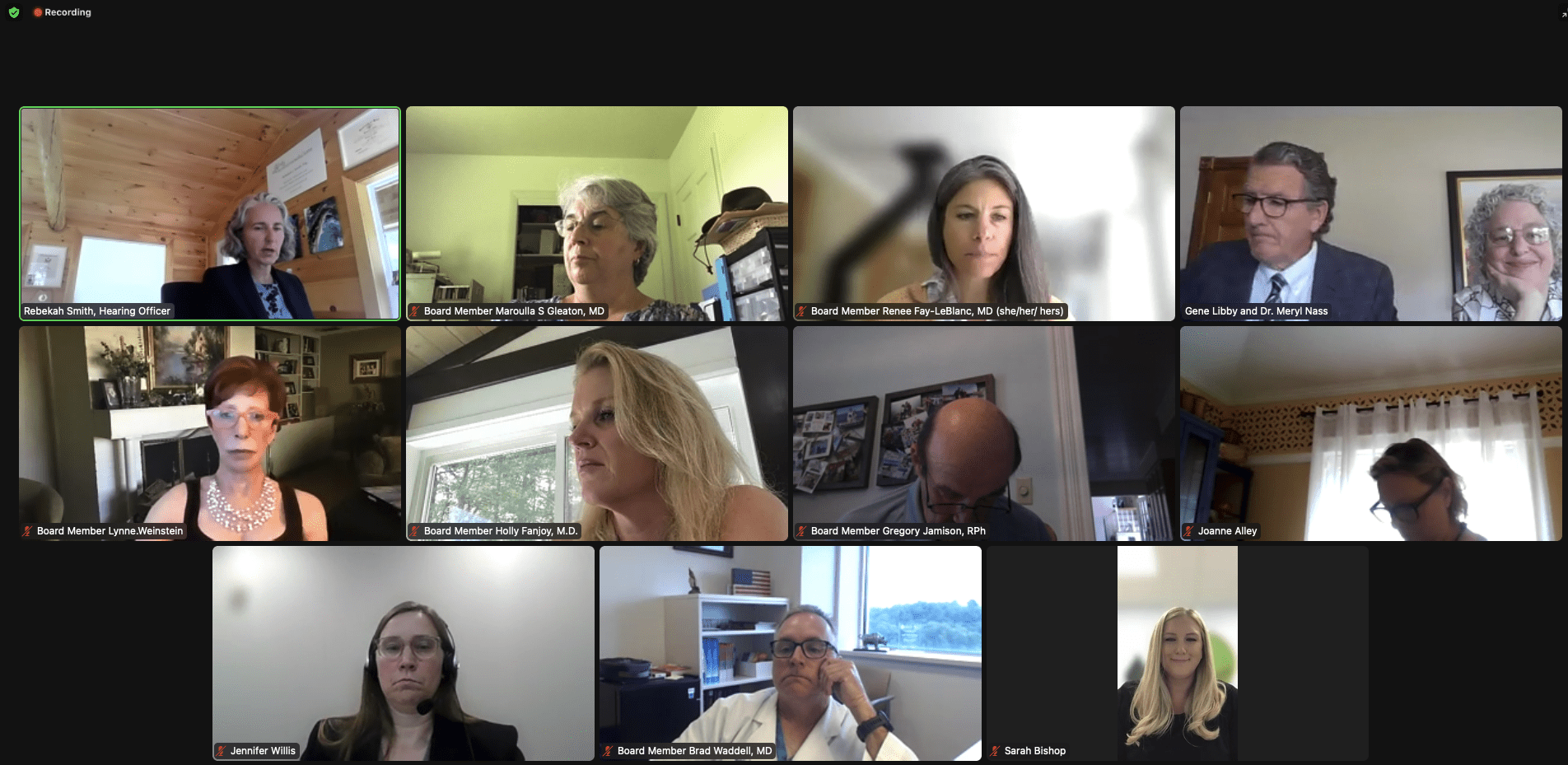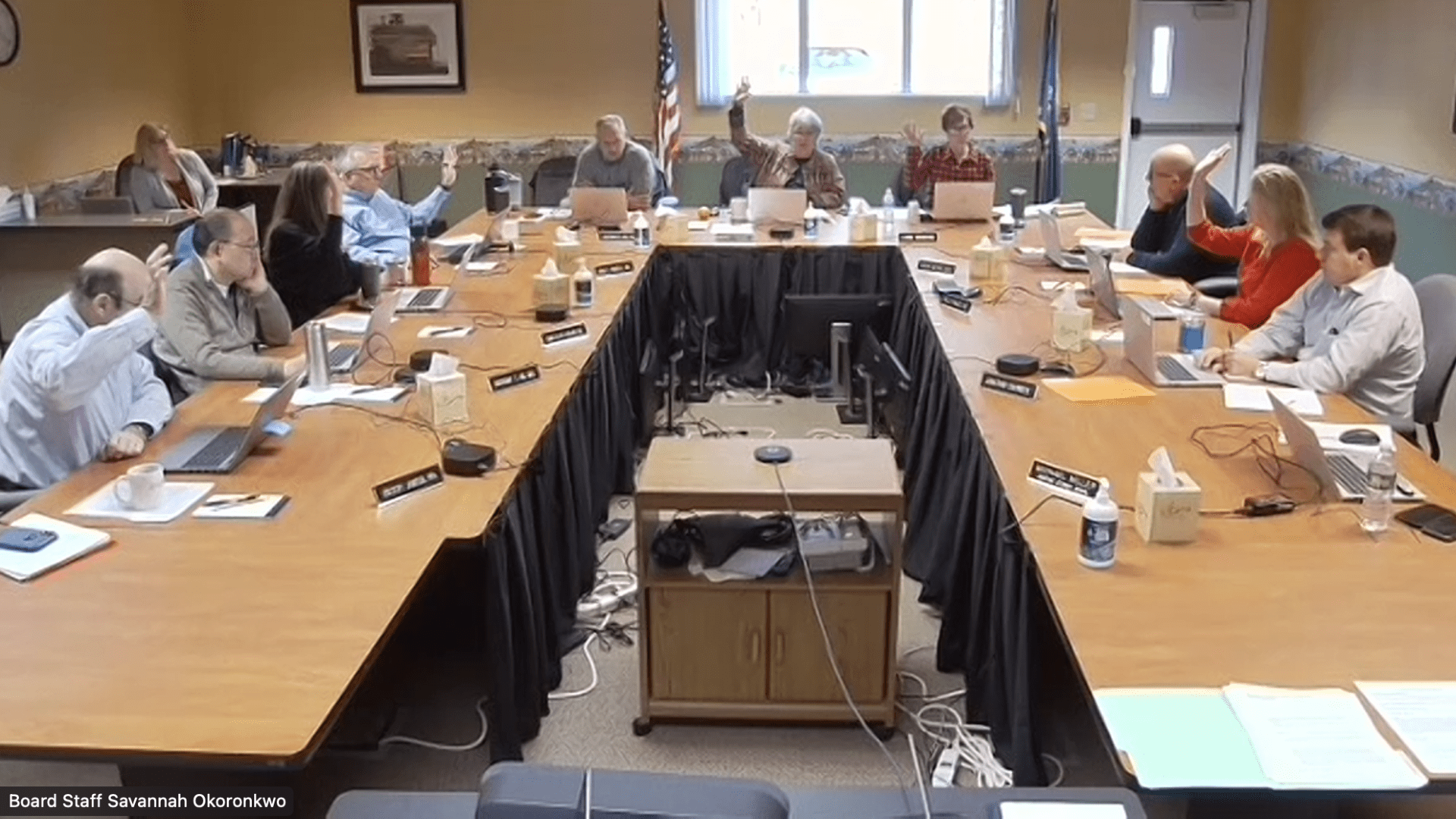A state regulatory board voted Tuesday to extend the suspension of a medical license held by an outspoken doctor who has become a cause célèbre for vaccine skeptics, saying she violated multiple board rules while treating COVID-19 patients.
Ellsworth physician Meryl Nass failed to meet several standards of care while treating three patients diagnosed with COVID-19 from late 2021 to early 2022, the board determined.
Among the allegations are that Nass improperly prescribed the antiparasitic drugs ivermectin and hydroxychloroquine for the treatment or prevention of COVID-19, that she knowingly lied to another health-care professional to obtain a hydroxychloroquine prescription, and she failed to keep proper medical records and documentation.
The board discussed and voted on the terms of the decision and order on the final day of Nass’ adjudicatory hearing Sept. 19, ending a hearing that spanned seven days and nearly 50 hours over 11 months. The initial complaints against Nass were filed in late 2021.
The six board members present at the September hearing voted unanimously to find that Nass’ actions were grounds for discipline in eight of the 13 counts against her, including four counts related to patient care and competence to practice medicine, three related to medical recordkeeping and one related to truth-telling and misrepresentation.
The board’s grounds for disciplinary action were amended three times prior to the September hearing, with six additional counts withdrawn.
The board issued reprimands for three violations “that the Board found reflected poor decision-making by the Licensee,” according to the decision and order.
It also extended Nass’ suspension for until April 30, 2025, when her license is up for renewal again, unless she meets the conditions of probation set by the board. She can return to practice earlier if she meets those conditions sooner.
Nass’ license has been suspended since January 2022 and with the extension, her suspension will total 39 months.
In a discussion that lasted less than five minutes Tuesday, doctors Maroulla Gleaton, Holly Fanjoy, Renee Fay-LeBlanc and Brad Waddell, along with Gregory Jamison and Lynn Weinstein, voted unanimously to approve the decision and order. Jonathan Sahrbeck, and doctors Christopher Ross, Noah Nesin and Anthony Ng abstained because they were not at the adjudicatory hearing.
Although Nass and her attorney, Gene Libby of Kennebunk, were present, they were not invited to speak.
Libby did not respond to a call and email requesting comment Tuesday.
Nass said in a Substack post published shortly after Tuesday’s meeting that she had not seen the decision and order, and Libby was only allowed to see it after the vote.

“At some point soon my attorney will receive the board’s decision on punishment,” she said. Nass has 30 days to appeal the decision and order.
The decision and order says Nass’s suspension will be automatically lifted if she completes continuing education courses totaling 10-18 hours on ethics and record-keeping; submit a telemedicine practice plan; participate in a clinical competence assessment and find a practice monitor. Nass must complete these items within 120 days.
If the suspension were lifted, Nass would be on probation for two years with the practice monitor — a board-approved physician who will review 10 random patient charts monthly and submit quarterly reports to the board — in place. The practice monitor can petition the board to terminate the arrangement before the two years are up but not before one year.
The board declined to impose civil penalties, which could have amounted up to $12,000. Board statute says the board can impose $1,500 in civil penalties for each violation.
They did order her to pay 50% of hearing costs — which board staff estimated was upwards of $25,000 – but capped it at $10,000 to be paid within six months. Nass had the opportunity to contest her ability to pay any fines but declined to provide financial documents, according to hearing office Rebekah Smith, the principal attorney for Seven Tree Solutions.
Dr. Jeff Barkin, a Portland psychiatrist and past president of the Maine Medical Association and the Maine Association of Psychiatric Physicians, said the board handed down a fair and appropriate punishment.
“Members of licensure boards make a significant commitment of time and energy for their participation in the process. And all of the members of the Board of Licensure in Medicine are to be commended for their time and effort in this complicated case,” Barkin said.
“I think they’re also to be commended for a very even-handed outcome, insofar as it allows Dr. Nass a path forward so that she can practice with skill and safety, while allowing her an opportunity to learn and take classes and rehabilitate herself so that we all can feel comfortable that the public is protected.”
Nass fought the allegations from the start. In a blog posted to her Substack after the Sept. 19 hearing, she said the board created a “false model” of how she runs her practice to “tar and feather me.”
The board’s case is a “spurious, illegal, unjustified, without-grounds persecution” to go after her license, she told the Monitor in late July.
Nass is only one of three doctors who have been disciplined for COVID-related matters in Maine, a Monitor review of disciplinary actions from the state’s medical and osteopathic licensure boards between March 2020 and August 2023 found.
Maine doctors accused of COVID-related violations, such as prescription of unapproved medications for COVID treatments to improper issuance of medical exemption letters for health-care workers who were in noncompliance with state immunization requirements, constitute less than 1 percent of all cases, the Monitor found.
In August, Nass filed a federal complaint in the District Court of Maine, claiming the board as a whole and the nine board members in their individual capacities violated her First Amendment rights to freedom of speech.
The board’s actions and conduct were “motivated by evil motive or intent toward” Nass, and were “done in a manner that was malicious, oppressive, outrageous, reckless, wanton, and willful, and demonstrated actual or implied malice,” according to the complaint.
The Attorney General’s office, which represents the board, filed a motion in November to dismiss the complaint on the grounds that Nass failed to state a claim and that federal courts lack jurisdiction over the matter. Judge Jon D. Levy scheduled a Jan. 10 hearing in Portland on the motion to dismiss.
At the Sept. 19 hearing, the board voted unanimously that there was sufficient evidence that Nass violated board statute on four counts of patient care and competence to practice medicine, three counts of medical record-keeping and one count of “truth-telling and misrepresentation.” It voted against finding her in violation of an additional five counts.
Several board members said during their deliberations they were most concerned about the allegation that Nass told a pharmacist she prescribed hydroxychloroquine for a patient with Lyme disease when that patient actually had COVID, and that she admitted as much.
Dr. Brad Waddell, a Bangor surgeon, said the incident was “not only intentional, it was unnecessary. I think it was clearly to get us where we are.”
Nass told the board in a Dec. 11, 2021, email that she was “forced … to provide misinformation: that I was prescribing the drug for Lyme disease, as this was the only way to get a potentially life-saving drug for my patient.”
She told state lawmakers at a virtual hearing days later that she “lied” to the pharmacist about her patient’s diagnosis.
A week later, when Nass informed another patient’s son that the board subpoenaed his mother’s medical records, Nass wrote in a text message, “I know some crack attorneys. I certainly was hoping to make a public spectacle of an investigation.”
Dr. Maroulla Gleaton, an Augusta ophthalmologist and the board chair, said in September she’d seen enough throughout the hearing to give her a sense that “there’s some secondary gain here of showmanship, of a little bit of blowing out of proportion or kind of the wow factor that really, we’re not really part of or interested in.”
Since her license was suspended in January 2022, Nass has become a prominent figure in anti-vaccine circles in Maine and nationally. Children’s Health Defense, an anti-vaccine advocacy group founded by independent presidential candidate Robert F. Kennedy Jr., is paying her legal fees, Nass said in July.
In the Sept. 19 blog post, Nass held steadfast that she acted in the best interest of her patient when she lied and said it was “the only way” to get her patient the medication since the board “illegally” prevented pharmacists from dispensing hydroxychloroquine.
The licensure board nor any other state or federal agency has made it illegal to dispense hydroxychloroquine for COVID-19.
The U.S. Food and Drug Administration has not approved hydroxychloroquine, which is typically used to treat malaria, lupus and rheumatoid arthritis, for the treatment or prevention of COVID-19. It warned against using the drug outside of hospital settings or clinical trials due to serious heart risks.
In April 2020, the Maine Board of Pharmacy issued a statement urging pharmacists to “use their professional judgment and take appropriate steps to verify that newly issued prescriptions” for chloroquine, hydroxychloroquine and azithromycin, commonly sold under the brand name Z-Pak, are for “legitimate medical purposes and not for prophylactic treatment unless consistent with prescribing guidelines.”
Inappropriate prescriptions for these drugs “may lead to stockpiling of medication, inappropriate use, and potential drug shortages that could adversely impact patients with legitimate and immediate needs for these medications,” the pharmacy board said.
Waddell said Sept. 19 that knowing this was a line Nass wasn’t afraid to cross, “I don’t know what other boundaries she’s not afraid (of.) I don’t know what other situations she would feel comfortable lying in.”
In a closing statement, Nass’ attorneys, Libby and Tyler Smith, argued the board and its staff, not Nass, are responsible for creating a “public spectacle by pretending that this … is about the quality of Dr. Nass’ medical care, when it is in fact about censorship and making an example out of Dr. Nass.”

Nass has continued to appear on Children’s Health Defense radio and internet shows, and other media outlets. According to her blog posts, she has traveled globally as a representative for a newly created organization called “Door to Freedom.”
In a Nov. 27 Substack post, Nass said she and Swiss attorney Philipp Kruse have been “meeting with lawmakers in six parliaments over the past two months … shedding light on the (World Health Organization)’s shenanigans.”
“Board members and activists have paid for all this, with my Substack earnings providing the bulk of the expenses for DoorToFreedom.org’s work, and some of the travel expenses,” she said in the post, which also included a solicitation for donations to the group.
The state medical board ultimately dropped complaints related to Nass’ earlier posts on social media.
As the Sept. 19 hearing wrapped up, Gleaton, the board chair, thanked board members and staff for their work. The hearing went on longer than any other in “my total experience on the board and I hope forever going forward,” she said.
“It’s been a long haul.”







